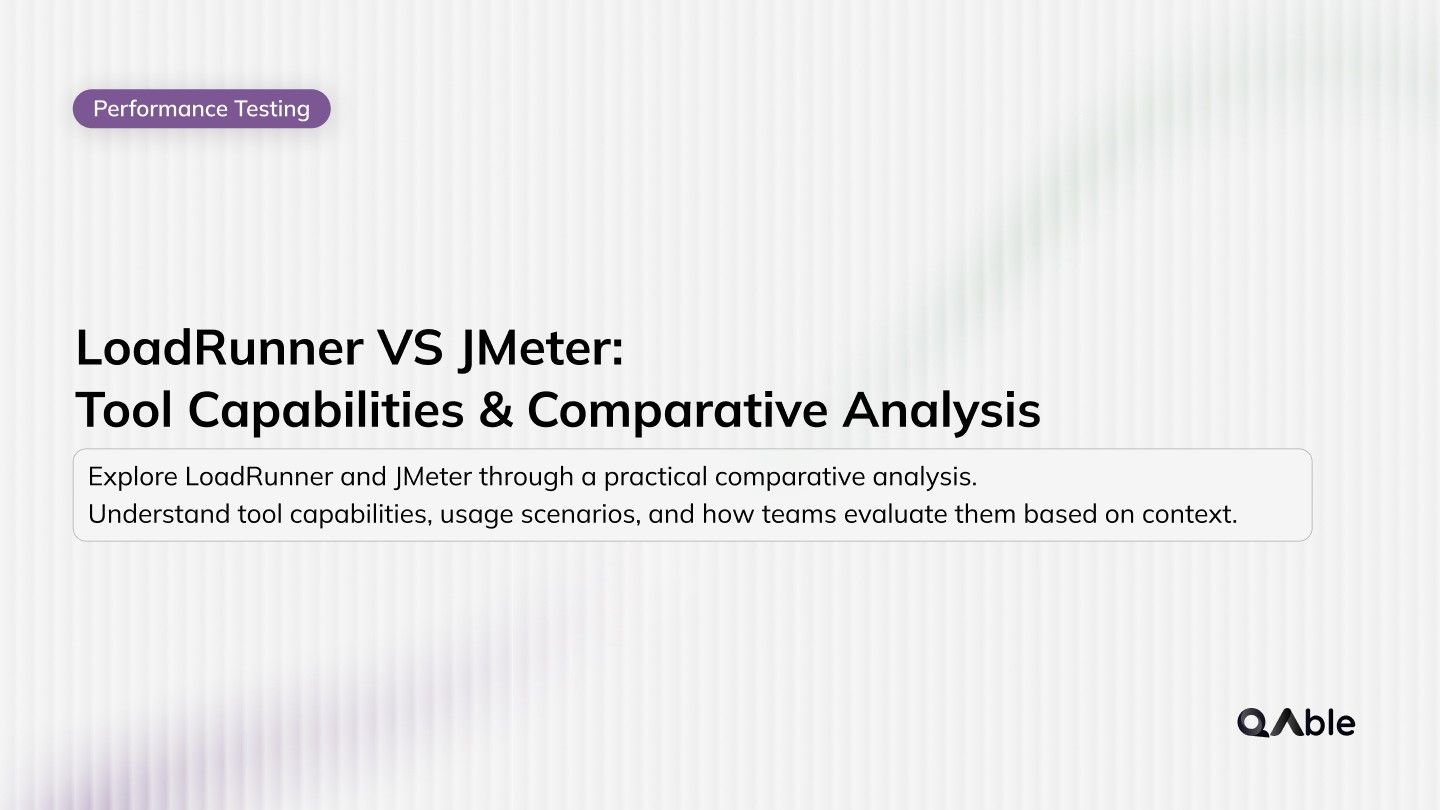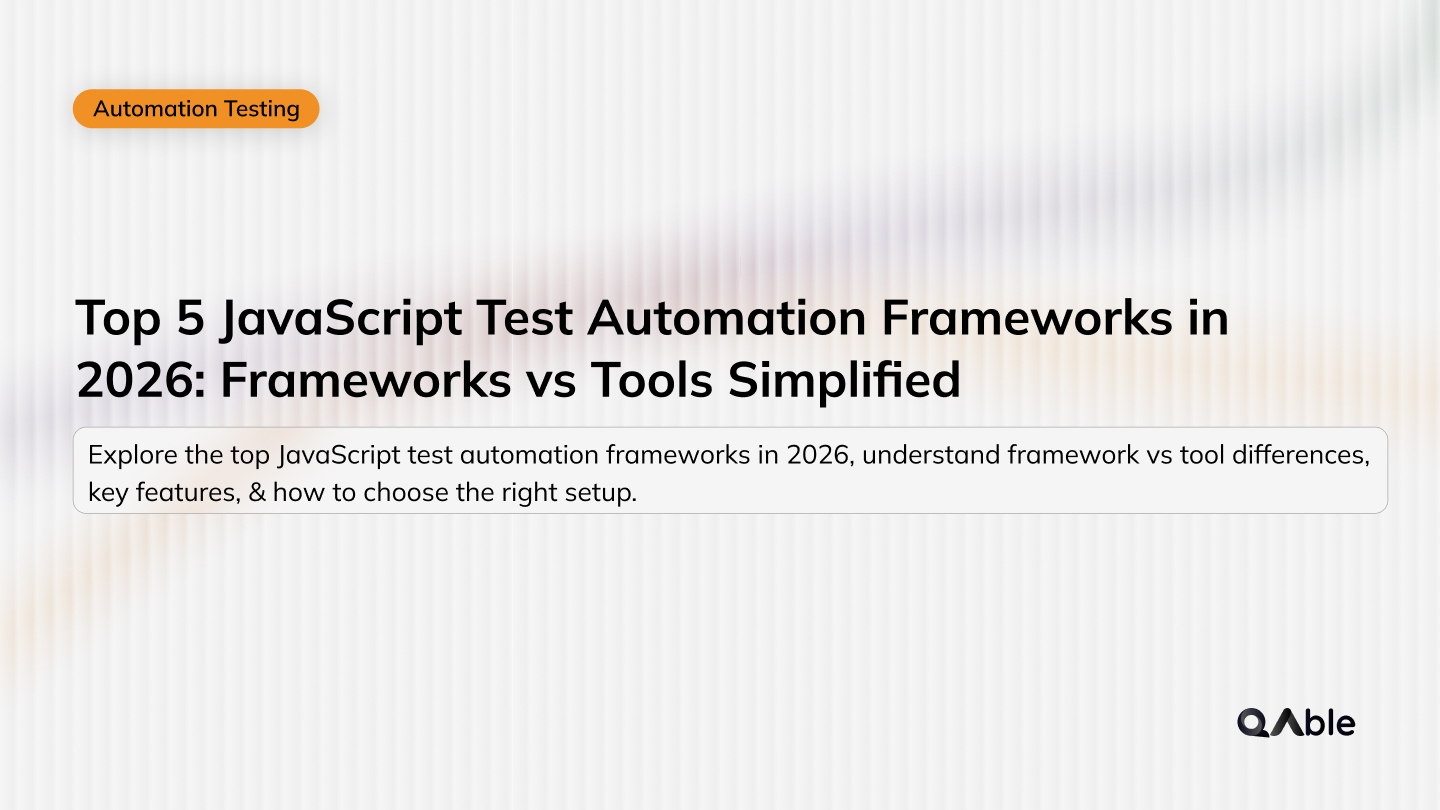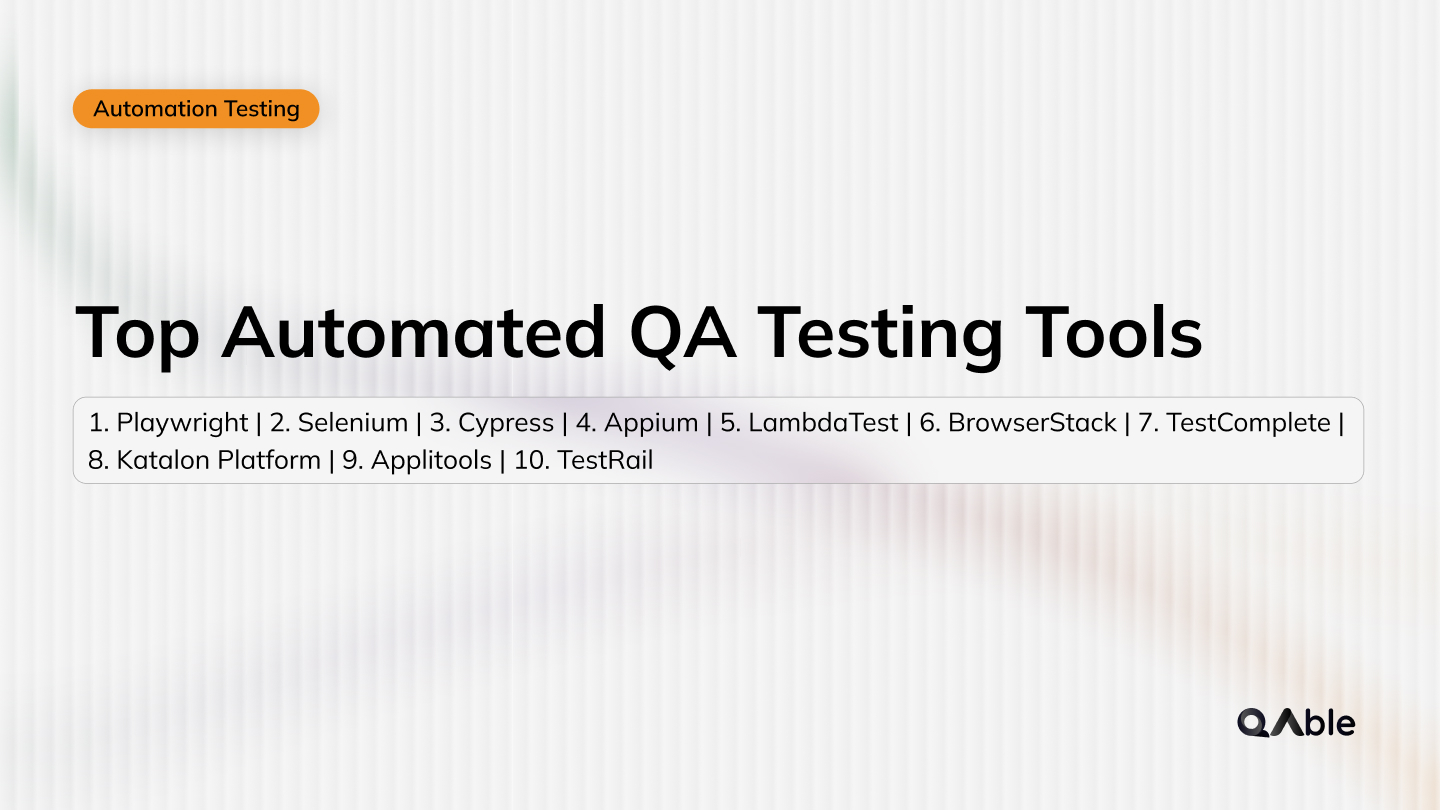Table of content
SHARE THIS ARTICLE
Is this blog hitting the mark?
Contact Us
Table of Contents
- The Importance of Quality Assurance in EdTech
- Challenges in EdTech Software Testing
- Types of Testing Services for EdTech
- Practical Solutions for EdTech Testing
- Innovation Through Testing
- How We Can Help You
- FAQs
Calling all EdTech innovators! This blog post is your roadmap to building rock-solid educational software.
Great educational technology (EdTech) can transform learning. But how do you ensure your app is reliable and delivers the impactful learning experience you envisioned? That's where educational software testing comes in.
This guide is written specifically for you:
- Startup Founders: Building the next big EdTech app? Testing will ensure a smooth launch and happy users.
- Enterprise CTOs: Scaling up your learning platform? Testing safeguards quality and protects your reputation.
- Project Managers: Keeping your EdTech project on track? Testing helps you identify and fix issues early, saving time and money.
By the conclusion of this post, you'll grasp:
- The hidden challenges that can trip up EdTech projects.
- The different types of testing designed to catch these issues.
- Actionable steps to improve your EdTech software's quality.
Get ready to turn testing from a hurdle into a launchpad for innovation and learning success!
The Importance of Quality Assurance in EdTech
Quality assurance (QA) in educational technology is like a lighthouse guiding ships through stormy seas. It's a methodical approach to guarantee EdTech products satisfy quality requirements and serve their purpose.
Quality Assurance Definition QA is about great product performance and customer happiness. This involves making bug-free, intuitive, entertaining, and informative EdTech software. It anticipates and resolves problems before they hinder learning.
Important in Education Technology QA is crucial in EdTech. Technology in education raises the stakes. A well-tested instructional software may help a student understand a hard idea. QA guarantees software reliability, which helps instructors teach and students learn.
Effects on UX and Learning QA improves user experience by making software easy to use. This includes rapid loading, easy navigation, and device and platform compatibility. Students interact more with information when the user experience is good, improving learning results. In addition, QA helps discover and remove learning obstacles like confusing interfaces and content problems, making knowledge acquisition easier.
Successful EdTech products depend on quality assurance. It secures developers' and instructors' investments and, more significantly, students' education. We can improve schooling with technology by using rigorous QA processes.
Also Read: Outsource Software Testing & QA
Challenges in EdTech Software Testing
Navigating the world of EdTech software testing is like embarking on an expedition where each step presents its own set of challenges. These hurdles are not just obstacles but opportunities to refine and enhance the educational tools that shape the minds of learners.
Common Issues Faced in the Testing Process
- Compatibility Across Devices: With a myriad of devices used in educational settings, ensuring software performs consistently across all platforms is a daunting task.
- User Interface (UI) Complexity: The need for a simple yet effective UI in educational software adds layers of complexity to the testing process.
- Content Accuracy: Ensuring that the educational content is accurate and up-to-date requires meticulous verification.
- Engagement Metrics: Testing for user engagement and educational efficacy can be subjective and requires innovative approaches.
- Scalability: As the number of users grows, the software must be tested for its ability to scale without performance degradation.
- Regulatory Compliance: Meeting the strict standards of data protection and privacy, especially for minors, is a critical aspect of testing.
The Unique Demands of Educational Software on Testing Protocols
- Adaptive Learning Paths: Educational software often includes adaptive learning technologies that require complex testing to ensure they respond appropriately to each user’s learning journey.
- Interactive Elements: Features like quizzes, interactive simulations, and collaborative tools present unique testing challenges to ensure they work seamlessly.
- Accessibility: Ensuring that software is accessible to all students, including those with disabilities, is not just a legal requirement but a moral imperative.
- Real-Time Feedback: Testing for real-time feedback mechanisms is crucial as they play a significant role in the learning process.
Navigating these challenges requires a testing approach as flexible as the educational landscape. By addressing these issues directly, we can ensure that EdTech software meets the standards of educators and learners and remains relevant in the evolving educational environment.
Types of Testing Services for EdTech
In the quest to perfect educational software, various testing services come into play, each with its own specialty in enhancing the quality and efficacy of EdTech products. Let’s explore these services and understand their role in the evolution of educational technology.
Automation Testing
- Streamlining Repetitive Tasks: Automation testing uses software tools to execute pre-scripted tests on the application automatically. This not only speeds up the testing process but also increases accuracy, allowing testers to focus on more complex tasks.
Functional Testing
- Ensuring Every Feature Works as Intended: Functional testing verifies that each function of the software operates in conformance with the requirement specification. This is crucial in educational software to ensure that all features, from lesson plans to quizzes, function correctly.
Security Testing
- Protecting Sensitive Educational Data: Security testing is essential in safeguarding student and institutional data. It involves identifying vulnerabilities within the software that leads to data breaches, ensuring that personal information remains confidential and secure.
AI Software Testing
- Leveraging AI for Smarter Testing Strategies: AI software testing incorporates artificial intelligence to predict outcomes, generate test cases, and automate complex testing scenarios. It’s a forward-thinking approach that can adapt to the software’s learning curve.
Performance Testing
- Gauging Software Responsiveness and Stability: Performance testing measures how the software performs under specific conditions. It’s vital to ensure that the software can handle multiple users simultaneously, maintain speed, and remain stable under load.
Exploratory Testing
- Unscripted Testing to Uncover Unexpected Issues: Exploratory testing is an approach that allows testers to explore the software without predefined tests, encouraging creativity and intuition in identifying issues that scripted testing might miss.
User Acceptance Testing (UAT)
- Validating Software with End-Users: UAT is the final phase of testing, where the real end-users test the software to verify if it can handle required tasks in real-world scenarios. This is particularly important in EdTech, as it ensures the software meets the educators’ and learners’ needs.
Each of these testing services plays a pivotal role in the development of robust, user-friendly, and effective educational software. By employing a combination of these services, EdTech companies can ensure their products not only meet the highest standards of quality but also deliver a seamless and enriching learning experience.
Practical Solutions for EdTech Testing
Embarking on the journey of improving testing practices in EdTech is like setting sail towards a horizon of excellence. Here’s a step-by-step guide to navigate these waters, complemented by inspiring case studies of successful quality assurance implementations.
Step-by-Step Guide to Improving Testing Practices
- Assess Current Testing Landscape: Begin with a thorough assessment of your current testing processes. Identify strengths, weaknesses, and areas for improvement.
- Develop Comprehensive Test Cases: Create test cases that cover a wide range of user scenarios, devices, operating systems, and network conditions.
- Implement Systematic Regression Testing: Establish a routine for regression testing to ensure new updates do not disrupt existing functionalities.
- Incorporate Automation: Integrate automation testing to streamline repetitive tasks and free up resources for more complex test scenarios.
- Leverage AI and Analytics: Use AI to predict outcomes, generate test cases, and analyze results for smarter testing strategies.
- Focus on Security: Prioritize security testing to protect sensitive educational data from potential breaches1.
- Conduct Performance Testing: Regularly test software performance to ensure stability and responsiveness under various loads.
- Engage in Exploratory Testing: Encourage exploratory testing to uncover unexpected issues and enhance product robustness.
- User Acceptance Testing (UAT): Validate the software with real end-users to ensure it meets their needs and expectations.
- Iterate and Improve: Use feedback from all testing phases to continuously refine and improve the testing process.
Case Studies of Successful Quality Assurance Implementations
- Case Study 1: An EdTech company faced frequent crashes and functionality issues. Through rigorous testing and a revamped QA process, they significantly improved software reliability, leading to a better user experience and increased customer satisfaction.
- Case Study 2: A university developed a MOOC quality assurance framework, combining different approaches to ensure the quality of their online courses. They identified key indicators for evaluation, leading to enhanced course quality and learner engagement.
These practical steps and real-world examples showcase the transformative power of effective quality assurance in EdTech. By following this guide and learning from the successes of others, you can turn the challenges of software testing into opportunities for innovation and excellence in educational technology.
Innovation Through Testing
The convergence of testing and innovation within EdTech is a dynamic junction where fresh ideas emerge and established concepts evolve. Testing isn't merely about bug detection; it serves as a driving force for innovation, expanding the horizons of what educational software can accomplish.
How Effective Testing Can Lead to Innovation in EdTech
- Identifying Opportunities: Testing uncovers not just flaws but also opportunities for enhancement, leading to innovative features and functionalities.
- User-Centered Design: By focusing on the user experience during testing, EdTech can evolve to become more intuitive and effective.
- Quality-Driven Development: A rigorous testing process ensures that the final product is not only functional but also of high quality, setting the stage for a superior educational experience.
Examples of Testing-Driven Advancements in Educational Software
- AI-Driven Personalization: Testing has paved the way for AI algorithms that tailor learning experiences to individual needs, making education more accessible and effective.
- Immersive Technologies: Through testing, virtual and augmented reality have been integrated into EdTech, providing students with engaging and interactive learning environments.
- Gamification: The application of game mechanics in educational software has been refined through testing, resulting in higher engagement and motivation among learners.
Testing in EdTech is pivotal for envisioning and enhancing the future of education. It ensures that technological progress is matched by educational quality. Through diligent testing and ongoing refinement, we turn obstacles into opportunities for educational innovation. 🚀
How We Can Help You
At QAble, we understand that the journey through the dynamic realm of EdTech is filled with both challenges and opportunities. As India’s leading software testing company, we’re here to ensure that your educational software stands on the solid ground of quality assurance.
Let’s revisit the key insights that can transform your EdTech solutions:
- Quality Assurance Matters: It’s the cornerstone of successful educational software. We’re committed to delivering bug-free, user-friendly, and reliable products that empower educators and learners.
- Challenges as Opportunities: We see challenges—be it compatibility, UI complexity, or content accuracy—not as roadblocks but as chances for growth and excellence. We’re here to help you turn these challenges into opportunities for improvement.
- Types of Testing Services: Our suite of testing services, including automation, security, performance, and exploratory testing, is uniquely tailored to the EdTech ecosystem. We can help you elevate the quality of your educational tools.
- Practical Solutions: Our step-by-step guide is designed to empower your company to refine its testing practices. With our support, you can learn from real-world case studies and implement effective quality assurance.
- Innovation Through Testing: We believe that effective testing is about more than finding bugs—it’s about envisioning and driving the future of education. With our help, you can integrate AI-driven personalization, immersive technologies, and gamification to shape the EdTech frontier.
- Embrace Quality Assurance: As a founder, I invite you to see quality assurance not as a checkbox but as a strategic partner in your journey. Together, we can pave the way for a brighter, more innovative educational landscape.
Let’s continue this journey together, where testing is not a burden but a guiding light towards educational excellence. Join us at QAble, and let’s make a difference in the world of EdTech. 🌟
Discover More About QA Services
sales@qable.ioDelve deeper into the world of quality assurance (QA) services tailored to your industry needs. Have questions? We're here to listen and provide expert insights


Nishil Patel is the Co-founder of QAble, delivering advanced test automation solutions with a focus on quality and speed. He specializes in modern frameworks like Playwright, Selenium, and Appium, helping teams accelerate testing and ensure flawless application performance.
.svg)














.webp)
.webp)
.png)
.png)











.png)



.png)

.png)

.png)






.jpg)






.jpg)
.png)





.webp)

